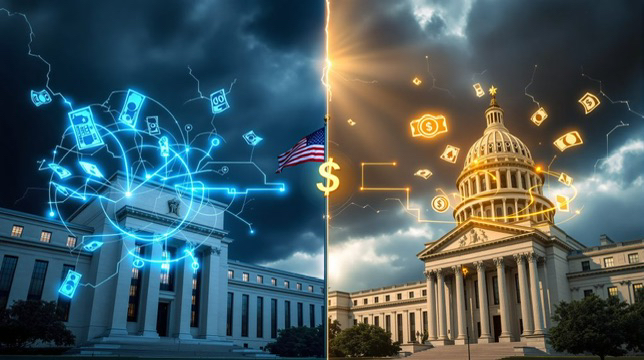

The U.S. Congress has approved a bipartisan deal to reopen the government and send the bill to President Trump for his approval.
The Federal Reserve is now facing a shortage of jobs and inflation data ahead of its critical December meeting on interest rates.
Agencies like the SEC and CFTC are resuming rulemaking on cryptocurrency, while Congress prepares for new budget battles.
Congress passed a bill to end the historic 43-day U.S. government shutdown, bringing relief to federal agencies and millions of workers affected by the crisis.
On November 12, 2025, the House approved legislation to reopen the government, followed by a 60-40 vote in the Senate. The bill is now headed to President Trump.
Historic shutdown disrupts services nationwide
The 43-day shutdown, the longest in U.S. history, halted federal contracts, suspended food aid payments, and led to thousands of flight cancellations across the country. It also caused over 2,500 flight cancellations due to a worsening shortage of air traffic controllers. Agencies like the FAA worked to maintain airport operations. Towards the end, more staff returned as lawmakers moved towards a resolution.
Companies reliant on federal contracts suffered significant losses. Native American tribes like the Fort Peck Assiniboine and Sioux tribes had to slaughter buffalo to provide food when federal funds stopped. Many college students relying on the federal SNAP program (food assistance) turned to campus support services.

The compromise bill ignited a heated debate in Congress. Democratic leaders, including Nancy Pelosi, objected to provisions that would cut funding for Medicaid and Medicare, stating it would jeopardize affordable healthcare.
Despite these concerns, House Speaker Mike Johnson negotiated the agreement to restore federal services and avoid deeper economic harm. The 60-40 vote in the Senate showed bipartisan urgency to resolve the impasse.
Next steps and lingering concerns
With the legislation on the president's desk, agencies are preparing to resume normal operations.
As the December meeting approaches, the Federal Reserve will still have some limits on uncertainty, but it will continue to face significant challenges due to data disruptions during the shutdown. The government has not fully released important job and inflation data for October, or it may have permanently missed them. This leaves the Federal Reserve with incomplete information as it approaches its December meeting.
As a result, the Federal Reserve is expected to proceed with caution, likely leaning towards maintaining interest rates or lowering them to support economic growth and employment amid ongoing risks and uncertainty. The end of the shutdown means data collection can resume, but it will take time for the full financial picture to emerge.
Meanwhile, federal agencies involved in regulating cryptocurrencies and overseeing markets are expected to resume their normal operations. The Commodity Futures Trading Commission (CFTC), SEC, and other agencies like the IRS and OCC will resume rule-making, enforcement, and regulatory analysis. This will expedite approvals for new exchange-traded funds and other products awaiting SEC review, which were delayed due to the forced holidays.
The resumption of regulatory activities also affects responses and developments related to broader technical financial legislation, such as the recent Senate agriculture bill to allow the Commodity Futures Trading Commission (CFTC) to oversee spot cryptocurrency markets, the confirmation hearing for the new CFTC chair, and the GENIUS Act.
On the other hand, it remains uncertain whether this agreement will prevent similar shutdowns in the future. The effects of the shutdown will continue to impact contractors, federal workers, airports, tribal groups, and low-income families.
#FederalReserve #Federal_Open_Market_Committee #BinanceSquareFamily #BinanceSquare #BinanceSquareTalks